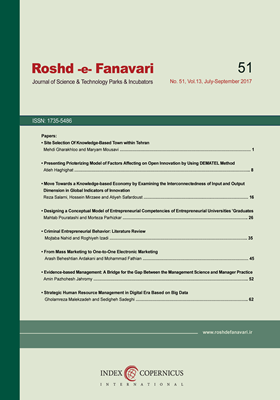Move Towards a Knowledge-based Economy by Examining the Interconnectedness of Input and Output Dimension in Global Indicators of Innovation
Subject Areas : نوآوري و خلاقيتreza salami 1 , hossien mirzaee 2 , atiyeh safardoust 3
1 - Allameh Tabataba’I University
2 - Allameh Tabataba’I University
3 - دانشگاه آزاد اسلامی
Abstract :
In the current decade, knowledge based economy is a popular term in the scientific circles of the country. This word has attracted the attention of many scholars and experts. The global index of knowledge based economy has four foundations, and innovation is one of these bases. In the area of innovation, Iran has less privilege than the global average. In order to promote the level of innovation and, consequently, the level of knowledge-based economy, using the global statistics in the field of knowledge based economy and innovation, in this paper first of all, we recognize the important input factors influencing the innovation and then we compare the status of these inputs with the global average. After identifying the weaknesses in the inputs, the status of these measures is reviewed in the Sixth Development Plan document. According to the findings, it was found that in the sixth program of development, only gross domestic product (GDP) per unit of energy consumption was pointed out, and no direct reference was made to other measures. Comparison of measures with the global average showed that in order to improve the output of innovation, the country needs to improve the level of research and development, knowledge workers, ICT and the political environment.
1- انتظاریان، ناهدی. تأثیر کسب و کارهای دانشبنیان بر رشد اقتصادی کشور. ماهنامه اجتماعي، اقتصادي، علمي و فرهنگي کار و جامعه ـ شماره1، ص 20-27، 1394.
2- ليست، فريدريش، معتمدي، ناصر، نظام ملي اقتصاد سياسي، تهران: شركت سهامي انتشار، 1370.
3- ورهرامی، ویدا. اقتصاد دانشبنیان و مدیریت نوآوری. کنگره ملی آموزش عالی ایران، 1395.
4- گرجیزاده، عطیه و شریفی رنانی، حسین، نقش اقتصاد دانشبنیان در کنترل تورم، مدلسازی اقتصادی، دوره 8، شماره 26، تابستان 1393، صفحه 107-125.
5- معمارنژاد، عباس، اقتصاد دانشبنیان: الزامات، نماگرها، موقعیت ایران، چالشها و راهکارها. 1384، فصلنامه اقتصاد و تجارت نوین، 1(1): 109-83.
6- یزدانی کاشانی، حسین و سعیدی، غلامرضا، جایگاه اقتصاد دانشبنیان در فرایند توسعه اقتصادی، الگوی اسلامی پیشرفت، 1393.
7- انتظاری، یعقوب و محجوب، حسن، تحلیل توسعه اقتصاد دانش ایران براساس سند چشمانداز 1404، راهبرد فرهنگ، شماره 24، زمستان 1392.
8- جنگانی، سمیرا و مهربانی، فاطمه و قبادی، صغری، مقایسه اثر اقتصاد دانشمحور بر رشد اقتصادی: مطالعه موردی ایران وکشورهای عضو سازمان همکاری اقتصادی و توسعه، اولین همایش الکترونیکی ملی چشمانداز اقتصادی ایران، 1392.
9- عظیمی، ناصر علی و برخورداری دورباش، سجاد، شناسایی بنیانهای اقتصاد دانشبنیاد، انتشارت مرکز سیاست علمی کشور، 1389.
10- Smith, Adam. An Inquiry into the Nature and Causes of the Wealth of Nations. No. 25202. Printed at the University Press for T. Nelson and P. Brown, 1827.
11- Becker, Gary S. "Human capital revisited." Human Capital: A Theoretical and Empirical Analysis with Special Reference to Education (3rd Edition). The University of Chicago Press,pp15-28., 1994.
12- Schumpeter, Joseph, and Ursula Backhaus. "The theory of economic development." Joseph Alois Schumpeter, pp 61-116, 2003.
13- Romer, Paul M. "Endogenous technological change." Journal of political Economy 98.5, Part 2 , pp S71-S102, 1990
14- Fucec, Adela Anca, and Marinescu Pirlogea Corina. "Knowledge Economies in the European Union: Romania's Position." Procedia Economics and Finance vol15, pp 481-489, 2014.
15- de la Paz-Marín, Mónica, Pedro Antonio Gutiérrez, and César Hervás-Martínez. "Classification of countries’ progress toward a knowledge economy based on machine learning classification techniques." Expert Systems with Applications 42. no1, pp562-572, 2015.
16- Tan, Hui Boon, and Chee Wooi Hooy. "The development of East Asian countries towards a knowledge-based economy: a DEA analysis." Journal of the Asia Pacific Economy 12, no, pp 17-33, 2007.
17- Chen, Derek HC, and Carl J. Dahlman. "The knowledge economy, the KAM methodology and World Bank operations." ,2005.
18- Blakeley, Nic, Geoff Lewis, and Duncan Mills. The economics of knowledge: what makes ideas special for economic growth?. New Zealand Treasury, 2005.
19- Cooke, Philip. Knowledge economies: Clusters, learning and cooperative advantage. Routledge, 2002.
20- World Bank, Building Knowledge Economies: Advanced Strategies for Development: 38 Global Innovation Index , 2016.


